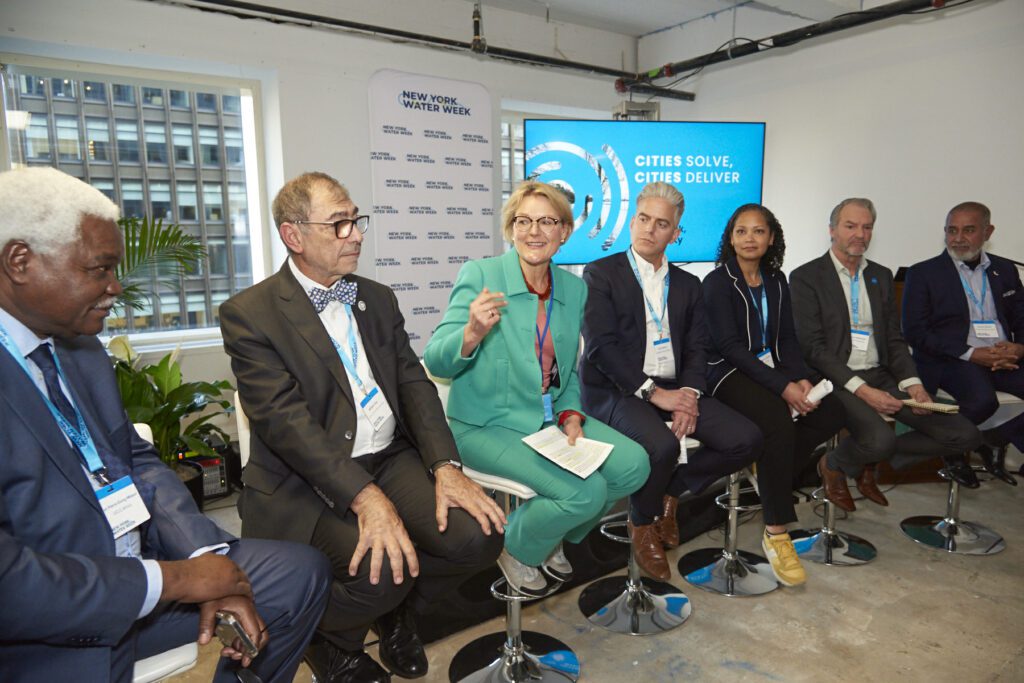Radical Collaboration Helping Global Cities Address Water Crisis

City officials, national government and community representatives, and other stakeholders from around the world gathered at New York Water Week to discuss the “radical” collaborations they are forming to help create solutions to the global water crisis. The event, an alliance between Resilient Cities Network and the Government of the Netherlands, comes at a critical moment, as the hydrologic cycle is broken for the first time.
“The hour is late and the time is now to act together,” said Lauren Sorkin, executive director of Resilient Cities Network, during opening remarks. “The challenge for water is very much concentrated in cities. They concentrate our risks and our opportunities. In these urgent times we need radical collaboration.”
Those risks and opportunities were the main discussion points throughout the Cities Solve, Cities Deliver – Accelerating Water Action for Resilient Cities event. Leaders spoke of the importance of working together and how they are addressing increased flooding, water pollution, and other issues facing cities and communities worldwide.
“The beauty of water is that the moment you work on it, people come together because everyone has a vested interest. That is what this conference is about – developing partnerships across geographies and cultures,” said Henk Ovink, special envoy International Water Affairs.
World Leaders Share Collaborative Spirit
A series of keynote speeches focused on collaborative approaches underway to address the water crisis. Among the speakers was Sylvester Turner, mayor of Houston, TX.
“Water is a valuable resource. We are learning how to live with it, protect it, and appreciate it,” explained Mayor Turner.
He noted that Houston has had a partnership with the Netherlands for years. In 2018, Houston developed its Living with Water plan that is based on the Dutch Dialogues after meeting with Dutch representatives. The relationship of cooperation continues to this day, as Houston has invested in the coastal spine, which is a series of gates along the Galveston Bay inspired by the Netherlands. All of these efforts are part of the Houston Resilient Strategy.

Mayor Turner also discussed Houston’s partnership with the city of Rotterdam, which has been beneficial to its resilient strategy. Other initiatives taken include widening Houston’s bayous and raising dams so water can naturally flow into the Gulf of Mexico. He also spoke of its land acquisitions to create major detention areas, as well as incentivizing developers to invest in green storm water infrastructure.
A second keynote was given by Governor Claudio Orrego of Santiago Metropolitan Region, Chile. The area is realizing less snowfall and the rapid melting of glaciers. The governor, recognizing this climate effect, developed a resiliency strategy in 2016. Collaboration with other countries, including Israel and Australia, has been instrumental to its success. Public and private businesses, academia, NGOs, and other stakeholders are also playing a vital role.
A key part of the plan is it to use existing water more intelligently. For example, Governor Orrego and his team discovered Israel reduced water leakage from pipes from 30% to 6%. Some water companies in Chile had leakage levels as high as 50%. Governor Orrego incentivized those companies to correct the problem. Another lesson learned from other countries was efficient re-use of treated water.
Attendees heard similar stories from other elected officials, including Mayor Ahmed Aboutaleb from Rotterdam, Netherlands. They also enjoyed a video that showcased transformative actions implemented by cities.
The event concluded with plenary sessions in which global leaders met and discussed their respective challenges and solutions. As was highlighted, these collaborations are one critical element to solve the water crisis.
